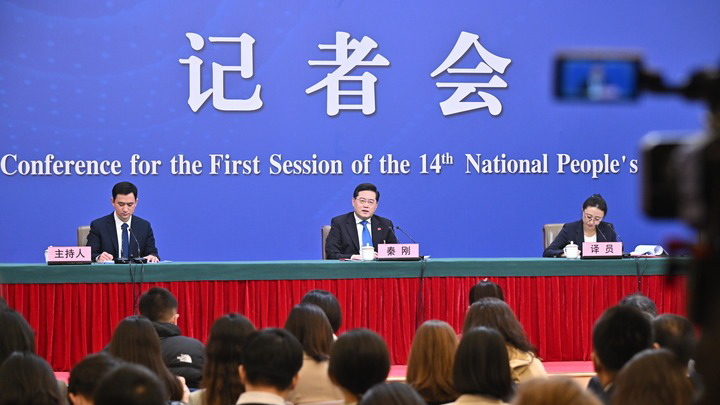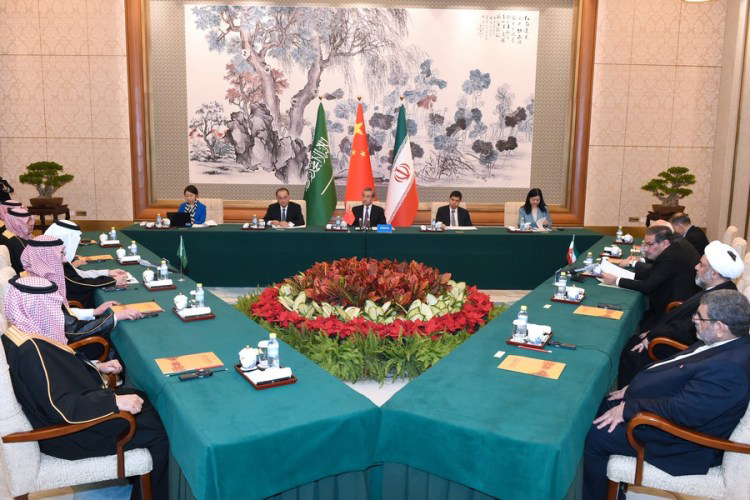
Chinese Foreign Minister Qin Gang (C, rear) attends a press conference on China's foreign policy and foreign relations on the sidelines of the first session of the 14th National People's Congress (NPC) in Beijing, capital of China, March 7, 2023. /Xinhua
Chinese Foreign Minister Qin Gang (C, rear) attends a press conference on China's foreign policy and foreign relations on the sidelines of the first session of the 14th National People's Congress (NPC) in Beijing, capital of China, March 7, 2023. /Xinhua
Editor's note: Yuan Sha is an assistant research fellow with Department for American Studies at China Institute of International Studies. The article reflects the author's opinions and not necessarily the views of CGTN.
On March 16, Chinese State Councilor and Foreign Minister Qin Gang had a phone call with Ukrainian Foreign Minister Dmytro Kuleba, reiterating China's commitment to promoting peace and facilitating negotiations. The tone is in stark contrast with the phone call between United States Secretary of State Anthony Blinken with Foreign Minister Kuleba on the same day when the U.S. side kept on fanning the flames.
As strategic partners, China and Ukraine have kept constructive engagement since the crisis began last year. Wang Yi, a member of the Political Bureau of the Communist Party of China (CPC) Central Committee and director of the Office of the Foreign Affairs Commission of the CPC Central Committee met with Ukrainian Foreign Minister Kuleba last September during the United Nations General Assembly in New York, and they met again this February on the margins of the Munich Security Conference.
On both occasions, Wang stressed China's support for the principle of territorial integrity and resolving the crisis in a peaceful way. China has also sent humanitarian aid to Ukraine. Lately, China announced to give approximately $210,814 to the International Atomic Energy Agency (IAEA) to help safeguard Ukraine's nuclear facilities.
This phone call between Qin and Kuleba is of great significance. First of all, the Ukraine crisis enters a new phase of grinding conflict, how to ease tensions and work out an equitable, feasible and sustainable solution has become a crucial test. China has proposed a position paper on the political settlement of the Ukraine crisis at its first anniversary, which addressed the security concerns of all parties and provided a rational pathway toward lasting peace in the region.
Second, it is the first time for Qin as Chinese Foreign Minister to talk with his Ukrainian counterpart. As the Chinese Foreign Ministry's statement noted, Qin stressed that "China upholds an objective and impartial position on the Ukraine issue, stays committed to promoting talks for peace, and calls on the international community to create enabling conditions for peace talks," demonstrating China's continued diplomatic effort to engage with Ukraine.
Last but not least, the call came prior to Chinese President Xi Jinping's upcoming state visit to Russia, which is featured as a trip of "friendship, cooperation and peace," according to China's Foreign Ministry. President Xi has proposed solutions to a ceasefire and peace talks since the crisis began.
Since China stands in a unique and impartial position with friendly relations with both Russia and Ukraine, how China would play its constructive mediating role between Russia and Ukraine is widely expected. China's successful mediation between Saudi Arabia and Iran with a landmark deal to restore diplomatic ties has earned China the credential of an honest and constructive broker.

Wang Yi (C), a member of the Political Bureau of the Communist Party of China (CPC) Central Committee and director of the Office of the Foreign Affairs Commission of the CPC Central Committee, presides over the closing meeting of the talks between a Saudi delegation and an Iranian delegation in Beijing, capital of China, March 10, 2023. /Xinhua
Wang Yi (C), a member of the Political Bureau of the Communist Party of China (CPC) Central Committee and director of the Office of the Foreign Affairs Commission of the CPC Central Committee, presides over the closing meeting of the talks between a Saudi delegation and an Iranian delegation in Beijing, capital of China, March 10, 2023. /Xinhua
In contrast to the Chinese call for rationality and restraint, the U.S. continues to add fuel to the fire. The phone call between U.S. Secretary of State Blinken and Ukraine Foreign Minister Kuleba centered on "expediting the delivery of artillery ammunition" as noted in the tweet by Kuleba. In fact, the U.S. has never engaged in serious diplomacy to prevent the crisis from breaking out in the first place.
Since late February 2022, the U.S. has apparently shifted to a strategy of turning the crisis into a "proxy war" by "fighting Russia to the last Ukrainian." The alleged U.S. involvement in the Nord Stream pipeline blast last September is widely suspected as a sabotage aimed at damaging diplomatic solutions.
The U.S. effort to keep flaring up tensions would only prolong the crisis, bringing a greater humanitarian disaster. More disconcertingly, as the U.S.-led arms transfer to Ukraine turns more offensive, the risks of both horizontal and vertical escalation are getting higher. The recent downing of the U.S. drone over the Black Sea also alerted us that provocative and imprudent military maneuvers risk spiraling out of control, putting the world on the brink of a direct conflict between two nuclear powers.
The Global South is getting increasingly uneasy about the U.S.-led extreme sanctions on Russia, which is making lives miserable in the developing and least-developed world and risks military bloc confrontation. Even inside the U.S., public support for prolonging the conflict by providing arms to Ukraine keeps waning as the public wake up to the fact that prolonging the conflict would only enrich the U.S. military-industrial complex.
Given the high stakes of the trajectory of the Ukraine crisis, it is imperative for countries to return to reason and find a sustainable solution. China's diplomatic efforts to engage both Russia and Ukraine are commendable. And it is misguided for the U.S. to dismiss or even undermine the Chinese peace proposal or any other proposal. It would pay off if, just as Qin Gang wrote in the National Interest magazine during his tenure as Chinese ambassador to the U.S., "China and the United States should not only work together to tackle the warming of the global climate, but also seek maximum common ground in addressing the cooling of the international political climate."
(If you want to contribute and have specific expertise, please contact us at opinions@cgtn.com. Follow @thouse_opinions on Twitter to discover the latest commentaries in the CGTN Opinion Section.)